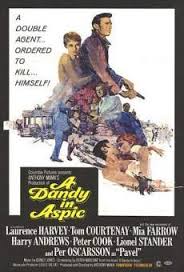
A DANDY IN ASPIC
UK, 1968, 100 minutes, Colour.
Laurence Harvey, Tom Courtenay, Mia Farrow, Peter Cook, Harry Andrews, Lionel Stander, Per Oscarsson, John Bird, Norman Bird.
Directed by Anthony Mann (and completed by Laurence Harvey).
A Dandy in Aspic dates from the late 60's when the cinema had undergone a spate of James Bond movies and an enormous number of spoofs on spies with even Doris Day getting into the act. But Le Carre's The Spy Who Came in From the Cold started a new trend in 1965, the anti-spy movement. The glamour was played down even though some of the excitement was retained. However, disillusionment and the ugliness of man's manipulation of man was the general tone of a series of films including The Executioner, The Looking- Glass War, The Naked Runner, The Kremlin Letter. A Dandy in Aspic fits into this category, the image behind the credits at beginning and end showing a puppet on a string.
This is quite a stylish film concentrating on clashes of personality rather than thrills or spectacle. Laurence Harvey gives a performance that is characteristic and yet nuanced differently from his other films. Tom Courtenay is once more a savage, feelingless, relentless spy. There are some cliches and corny dialogue, especially in the Mia Farrow sequences, but the film grows on the audience and the ending puts the spies out in the cold.
Popular director, Anthony Mann, (The Fall of the Roman Empire, E1 Cid, The Heroes of Telemark) died while making the film and it was completed by Laurence Harvey.
1. Just another spy film? Why?
2. What were the implications of the puppet imagery at the beginning and end of the film?
3. The film opened with a funeral and ended with two deaths. How important was death as a theme of the film?
4. Was it credible that Eberlin-Kraznaven? should have been able to live as a double agent for 18 years and kill some of the best British agents?
5. What was the effect of this double life on Kraznaven? Why did he want an identity? Why did he want to go back to Russia? Why was he not allowed?
6. Was the dandy, Eberlin, in any way the true Kraznaven or had he submerged whatever personality he had into Eberlin?
7. What kind of man was Pavel? What was the effect of the life of espionage on him? Did he want to die? Did he want Kraznaven to kill him?
8. Did you think that the British knew the identity of Kraznaven all the time?
9. What was the point of the girl in the film? Did you think she was an agent of some kind? Did Kraznaven come to love her? Why?
10. What image of the spy did Gatiss give? What kind of a man was he? What was wrong with him?
11. Why wouldn't the East Germans allow Kraznaven to enter?
12. How did you think the whole affair would end? Did you think the Russians would betray Kraznaven? How did the film make the audience share the spy's uncertainty and tension?
13. Was Peter Cook's jovial Prentiss just comic relief or did he convey something of the deceptive personality that a clever spy should have?
14. What did you think of Gatiss's use of the racing accident to shoot Harry?
15. Why did Gatiss defy Kraznaven to kill him at the end? Could the film have ended any other way?